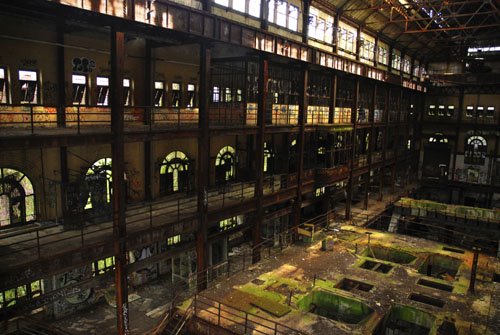---
 Glenwood Power Station. Photo courtesy imposemagazine.com
Glenwood Power Station. Photo courtesy imposemagazine.comOur friend Maya (whose wedding we attended in Vermont last September, at the beginning of our road trip West), recently put us up on some beautiful photos of the Glenwood Power Station in Yonkers, just north of NYC on the Hudson River.
The station was built in the early 1900s as part of the New York Central and Hudson River Railroad's switch from steam to electricity, and later used to supply power to Yonkers and the surrounding region. (The architects, Charles Reed and Allen Stem, also designed NYC's Grand Central Terminal, along with the firm of Warren & Wetmore.) The power station was shut down in the 1960s and has been peacefully decaying since then, although it apparently remains structurally sound.
 Photo courtesy imposemagazine.com
Photo courtesy imposemagazine.comThere have been attempts to protect the building through local landmark legislation, but those efforts have been stalled since 2005. In 2008, the Preservation League of New York State named the building to Seven to Save, its list of the most endangered properties in New York.

 Photos courtesy imposemagazine.com
Photos courtesy imposemagazine.comThe building's current owner is actively marketing it for development. A proposal to turn it into an art museum with condo towers on top (removing the smoke stacks and skylight roof) was reportedly withdrawn in late 2007.
 Photo courtesy imposemagazine.com
Photo courtesy imposemagazine.comI hope that someone with the foresight to develop the building in a way that's respectful of the beauty of the original structure steps forward. If not, I'd rather just see it slowly disintegrate into its surroundings, industrial decay at its finest.
 Photo courtesy imposemagazine.com
Photo courtesy imposemagazine.comMore photos and information at Impose, here, and the Preservation League of New York State, here.